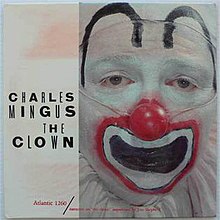The Clown (album)
| The Clown | ||||
|---|---|---|---|---|
 |
||||
| Studio album by Charles Mingus | ||||
| Released | Late August/early September 1957 | |||
| Recorded | February 13 and March 12, 1957 Atlantic Studios, New York City |
|||
| Genre | Jazz | |||
| Length | 40:41 | |||
| Label |
Atlantic SD-1260 |
|||
| Producer | Nesuhi Ertegün | |||
| Charles Mingus chronology | ||||
|
||||
| Professional ratings | |
|---|---|
| Review scores | |
| Source | Rating |
| Allmusic | |
The Clown is an album by Charles Mingus recorded and released in 1957 on Atlantic Records as SD-1260. It is the follow-up to 1956's Pithecanthropus Erectus and features the improvised narration of Jean Shepherd. A deluxe edition of The Clown was issued in 2000 on Rhino featuring two bonus tracks. All the tracks were recorded on March 12, 1957, except for "The Clown", recorded on February 13 of the same year.
According to Nat Hentoff's liner notes, Mingus explained why he chose those four tracks for the album: "I selected these four over two others that were more intricate because some of those guys had been saying that I didn't swing. So I made some that did. This album also has the first blues I've made on record."
The following excerpts come from the original liner notes and are statements made by Mingus himself.
On "Haitian Fight Song", Mingus said "I'd say this song has a contemporary folk feeling. My solo in it is a deeply concentrated one. I can't play it right unless I'm thinking about prejudice and hate and persecution, and how unfair it is. There's sadness and cries in it, but also determination. And it usually ends with my feeling: 'I told them! I hope somebody heard me.’ ".
"Blue Cee" is a standard blues in two keys, C and B♭, "but that's not noticeable and it ends up in C, basically", he said and continued "I heard some Basie in it and also some church-like feeling".
"Reincarnation of a Lovebird" is a composition dedicated to Bird. "I wouldn't say I set out to write a piece on Bird. [...] Suddenly I realize it was Bird. [...] In one way, the work isn't like him. It's built on long lines and most of his pieces were short lines. But it's my feeling about Bird. I felt like crying when I wrote it."
"The Clown" tells the story of a clown "who tried to please people like most jazz musicians do, but whom nobody liked until he was dead. My version of the story ended with his blowing his brains out with the people laughing and finally being pleased because they thought it was part of the act. I liked the way Jean changed the ending; leaves it more up to the listener."
All tracks written by Charles Mingus.
...
Wikipedia
